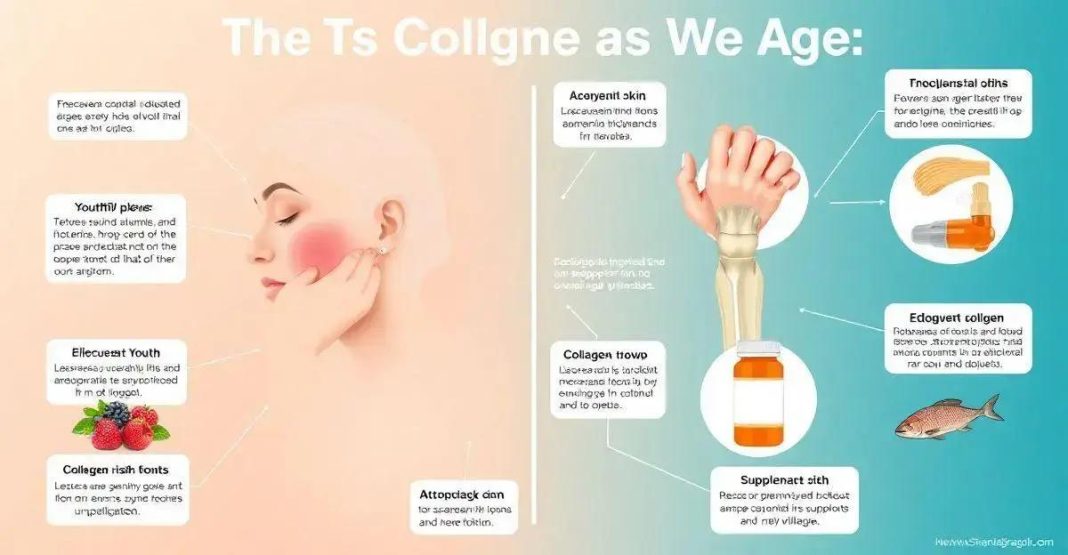Collagen is essential for skin, joint health, and overall well-being, but its production decreases with age, leading to aging signs and discomfort. To support collagen levels, individuals can consume collagen-rich foods, consider supplements, and adopt healthy habits like hydration, balanced diets, and UV protection. Prioritizing collagen health is crucial for aging gracefully and maintaining vitality, resulting in healthier skin and stronger joints.
Collagen as we age plays a crucial role in maintaining skin elasticity, joint health, and overall vitality. As we grow older, our bodies produce less collagen, leading to visible signs of aging and discomfort. In this article, we will explore the importance of collagen, how its decline affects us, and effective ways to support collagen production for better health.
Understanding Collagen
Collagen is the most abundant protein in our bodies, making up a significant portion of our skin, bones, muscles, tendons, and ligaments. It serves as a crucial building block, providing structure, strength, and elasticity to various tissues. There are at least 16 different types of collagen, but the majority of the collagen in our bodies consists of types I, II, and III.
Type I: This type is found primarily in skin, tendons, and bones and is known for its tensile strength. Type I collagen is essential for maintaining skin firmness and reducing the appearance of wrinkles.
Type II: Predominantly found in cartilage, type II collagen plays a vital role in joint health, providing cushioning and support to joints and maintaining their integrity during movement.
Type III: Often found alongside type I, type III collagen is important for the structure of skin, blood vessels, and internal organs. It contributes to the elasticity and firmness of our tissues.
Understanding Collagen
Collagen production naturally begins to decline as we age, with noticeable effects typically starting in our late 20s to early 30s. Factors such as genetics, diet, sun exposure, and lifestyle choices can also influence collagen levels in the body.
Understanding collagen and its role is essential to appreciating how its decline can affect our health and appearance as we age. By recognizing the importance of this vital protein, we can take proactive steps to support its production and maintain our overall well-being.

How Collagen Levels Change with Age
As we age, our bodies undergo various changes, and one of the most significant is the gradual decrease in collagen production. This decline can start as early as our late 20s and continues throughout our 30s, 40s, and beyond. Here’s a closer look at how collagen levels change with age and the factors that influence this process:
How Collagen Levels Change with Age
- Natural Decline: Research indicates that we lose about 1% of our collagen each year after the age of 25. This gradual reduction can lead to a decrease in skin elasticity, resulting in fine lines, wrinkles, and sagging skin.
- Hormonal Changes: Hormonal fluctuations, particularly during menopause, can further accelerate collagen loss in women. The decrease in estrogen levels affects collagen synthesis, contributing to more pronounced signs of aging in the skin and joints.
- Increased Exposure to Environmental Factors: Over the years, cumulative exposure to sun damage, pollution, and other environmental stressors can negatively impact collagen levels. UV radiation, for instance, can break down collagen fibers and inhibit new collagen production.
- Lifestyle Choices: Diet, smoking, and physical activity levels also play a role in collagen production. A diet low in essential nutrients, such as vitamin C, zinc, and amino acids, can hinder the body’s ability to produce collagen. Similarly, smoking can damage collagen and elastin fibers, further accelerating aging.
- Genetics: Genetic predisposition can influence how quickly collagen levels decline. Some individuals may experience more pronounced effects due to their genetic makeup, leading to earlier signs of aging.
Understanding how collagen levels change with age is crucial for recognizing the impact it has on our skin, joints, and overall health. By being aware of these changes, we can adopt strategies to support collagen production and mitigate some of the effects associated with aging.
Effects of Reduced Collagen on Skin
The decline in collagen production as we age has a profound impact on the health and appearance of our skin. Here are some of the key effects of reduced collagen levels on skin:
Effects of Reduced Collagen on Skin
- Loss of Elasticity: Collagen is essential for maintaining the skin’s elasticity. As collagen levels decrease, the skin becomes less resilient, leading to sagging and a lack of firmness.
- Formation of Wrinkles: With reduced collagen, the skin loses its ability to bounce back, resulting in the formation of fine lines and wrinkles. These are often most noticeable around the eyes, mouth, and forehead, where the skin is thinner and more prone to creasing.
- Dryness and Thinning: Collagen helps retain moisture in the skin. As collagen production decreases, the skin may become drier and thinner, making it more susceptible to irritation and environmental damage.
- Uneven Skin Tone: Reduced collagen can contribute to the development of uneven skin tone and texture. The skin may appear dull, with age spots or discoloration becoming more prominent as collagen levels decline.
- Slower Wound Healing: Collagen plays a critical role in the skin’s healing process. With lower collagen levels, wounds may take longer to heal, and the skin may not regenerate as effectively, leading to a higher risk of scarring.
- Increased Visibility of Scars: Collagen is necessary for repairing damaged skin. Reduced levels can lead to more visible scars from acne or injuries, as the skin’s ability to heal properly is compromised.
Recognizing these effects of reduced collagen on the skin underscores the importance of maintaining collagen levels as we age. By adopting healthy lifestyle practices and considering dietary or supplemental support, individuals can help mitigate the visible signs of aging and promote healthier, more youthful-looking skin.

Impact of Collagen on Joint Health
Collagen plays a crucial role in maintaining the health and functionality of our joints. As the primary protein found in cartilage, collagen is essential for joint structure and function. Here are some key ways that collagen impacts joint health:
Impact of Collagen on Joint Health
- Support for Cartilage: Collagen provides the necessary support and structure to cartilage, which acts as a cushion between bones in joints. Adequate collagen levels help maintain cartilage integrity, reducing wear and tear during movement.
- Reduction of Joint Pain: Studies have shown that collagen supplementation can lead to a reduction in joint pain and discomfort, particularly in individuals with osteoarthritis or those engaged in high-impact sports. By supporting cartilage health, collagen can help alleviate the friction that causes pain.
- Enhanced Mobility: Healthy collagen levels contribute to improved joint mobility and flexibility. By maintaining the integrity of cartilage and surrounding tissues, collagen helps ensure that joints can move smoothly without stiffness or discomfort.
- Improved Recovery: Collagen is vital for the repair and regeneration of joint tissues. After injury or intense physical activity, collagen assists in the recovery process, promoting healing and minimizing downtime.
- Joint Stability: Collagen helps maintain the stability of joints by providing structural support to ligaments and tendons. This stability is essential for preventing injuries, especially during physical activities that place stress on the joints.
Understanding the impact of collagen on joint health emphasizes its importance in overall mobility and quality of life. As collagen production declines with age, proactive measures, such as dietary changes and supplementation, can play a significant role in supporting joint health and preventing discomfort.
Dietary Sources of Collagen
Incorporating dietary sources of collagen into your nutrition can help support the body’s collagen production and maintain healthy skin, joints, and tissues. Here are some key dietary sources of collagen:
Dietary Sources of Collagen
- Bone Broth: One of the richest sources of collagen, bone broth is made by simmering animal bones and connective tissues. This process extracts collagen and other beneficial nutrients, making it a popular choice for promoting joint and skin health.
- Chicken: Chicken skin and cartilage are excellent sources of collagen. Consuming chicken, especially in dishes that include skin or slow-cooked methods, can provide a good amount of collagen.
- Fish and Shellfish: Fish, particularly those with skin, and shellfish are rich in collagen. Fish collagen is often more easily absorbed by the body, making seafood an effective option for boosting collagen levels.
- Eggs: Egg whites contain a high concentration of proline, an amino acid essential for collagen production. While eggs do not contain collagen directly, they provide the building blocks necessary for the body to create it.
- Leafy Greens: Dark leafy greens, such as spinach and kale, are rich in chlorophyll, which may help increase collagen levels in the skin. They also contain vitamins and minerals that support overall skin health.
- Nuts and Seeds: Nuts and seeds, particularly almonds and chia seeds, provide nutrients such as vitamin E and zinc, which are vital for collagen synthesis and skin health.
- Fruits: Citrus fruits (like oranges and lemons), berries, and other vitamin C-rich fruits are essential for collagen production. Vitamin C is a crucial cofactor in the collagen synthesis process, aiding the body in producing this vital protein.
- Legumes: Beans and lentils are excellent sources of protein and contain amino acids necessary for collagen formation. Including legumes in your diet can support overall protein intake and collagen production.
Incorporating these dietary sources of collagen into your meals can provide your body with the necessary nutrients to support collagen synthesis and maintain healthy skin, joints, and overall well-being. A balanced diet that includes a variety of these foods can help ensure optimal collagen levels as you age.

Supplements for Collagen Support
As collagen production naturally declines with age, many individuals turn to supplements to help maintain healthy levels of collagen in the body. Here are some common types of collagen supplements and their benefits:
Supplements for Collagen Support
- Hydrolyzed Collagen (Collagen Peptides): Hydrolyzed collagen is one of the most popular forms of collagen supplements. It is broken down into smaller peptides, making it easier for the body to absorb. These supplements are often found in powder form and can be added to smoothies, coffee, or other beverages.
- Collagen Capsules: For those who prefer a more convenient option, collagen capsules or tablets are widely available. They provide a pre-measured dose of collagen and can be easily incorporated into daily routines.
- Marine Collagen: Sourced from fish, marine collagen is known for its high bioavailability, meaning it is easily absorbed by the body. It is particularly beneficial for skin health and may help improve elasticity and hydration.
- Bovine Collagen: Derived from cows, bovine collagen is rich in type I and III collagen, making it a great option for skin and joint health. Bovine collagen supplements are available in various forms, including powders and capsules.
- Vegan Collagen Boosters: While true collagen is animal-derived, some supplements include ingredients that promote collagen production in the body, such as amino acids, vitamin C, and silica. These vegan options can support overall skin and joint health without using animal products.
- Bone Broth Powder: For those who enjoy the benefits of bone broth but may not have time to prepare it regularly, bone broth powder is a convenient alternative. It retains the collagen and nutrients found in traditional bone broth and can be easily mixed into soups, stews, or smoothies.
When choosing collagen supplements, it’s essential to look for high-quality products from reputable brands. Consulting with a healthcare professional can also help determine the best type and dosage of collagen supplements based on individual needs and health goals. Incorporating collagen supplements into your daily routine can be an effective strategy for supporting skin, joint, and overall health as you age.
Lifestyle Changes to Boost Collagen
Lifestyle Changes to Boost Collagen
In addition to dietary sources and supplements, making certain lifestyle changes can significantly enhance collagen production and support overall skin and joint health. Here are some effective strategies to boost collagen levels naturally:
- Stay Hydrated: Drinking plenty of water is essential for maintaining skin elasticity and overall health. Proper hydration helps keep skin plump and supports the body’s ability to produce collagen.
- Eat a Balanced Diet: Focus on a nutrient-rich diet that includes plenty of fruits, vegetables, lean proteins, and healthy fats. Nutrients like vitamin C, zinc, and amino acids are critical for collagen synthesis, so make sure to incorporate foods rich in these vitamins.
- Limit Sugar and Processed Foods: Excessive sugar intake and highly processed foods can lead to inflammation and damage collagen fibers. Reducing these foods in your diet can help preserve collagen and maintain skin health.
- Protect Your Skin from UV Damage: UV radiation from the sun can break down collagen and lead to premature aging. Protect your skin by using sunscreen, wearing protective clothing, and seeking shade when the sun is at its strongest.
- Quit Smoking: Smoking is known to accelerate the aging process and reduce collagen production. Quitting smoking can improve skin health and enhance the body’s ability to produce collagen.
- Get Enough Sleep: Quality sleep is vital for overall health and skin repair. Aim for 7-9 hours of sleep per night to allow your body to recover and promote collagen production.
- Engage in Regular Exercise: Physical activity increases blood circulation, which helps deliver essential nutrients to the skin and stimulates collagen production. Incorporate a mix of cardio, strength training, and flexibility exercises into your routine.
- Manage Stress: Chronic stress can lead to the production of cortisol, a hormone that can negatively impact collagen levels. Practice stress-reducing techniques such as meditation, yoga, or deep-breathing exercises to promote relaxation and overall well-being.
By adopting these lifestyle changes, you can create an environment that supports collagen production and helps maintain healthy skin and joints. Small, consistent adjustments to your daily routine can lead to significant improvements in your overall health and vitality.

Conclusion
Conclusion
In conclusion, collagen plays a vital role in maintaining the health and integrity of our skin, joints, and overall well-being.
As we age, the natural decline in collagen production can lead to various signs of aging, including wrinkles, joint discomfort, and reduced elasticity.
However, understanding the importance of collagen and implementing effective strategies can help mitigate these effects.
By incorporating dietary sources of collagen, considering supplements, and making positive lifestyle changes, individuals can support their body’s collagen production and promote healthier skin and joints.
Staying hydrated, eating a balanced diet, protecting skin from UV damage, and managing stress are key components of a holistic approach to collagen health.
Ultimately, prioritizing collagen health is an essential part of aging gracefully and maintaining a vibrant quality of life.
With the right knowledge and proactive measures, you can enhance your collagen levels and enjoy the benefits of youthful, resilient skin and strong, flexible joints for years to come.
Conclusion
In conclusion, collagen is an essential protein that significantly impacts our skin, joints, and overall health as we age.
The natural decline in collagen production can lead to visible signs of aging and discomfort, but understanding its role allows us to take proactive steps to support our collagen levels.
By incorporating dietary sources rich in collagen, considering high-quality supplements, and adopting healthy lifestyle changes, individuals can effectively boost their collagen production.
Staying hydrated, maintaining a balanced diet, protecting the skin from UV exposure, engaging in regular exercise, and managing stress are all effective strategies for promoting collagen health.
Emphasizing collagen in our health routines is vital for achieving youthful skin and maintaining joint integrity.
With the right approach, you can enhance your collagen levels, leading to improved health and vitality as you age.
Remember, small changes can yield significant results in your journey toward better health and wellness.
FAQ – Frequently Asked Questions about Collagen as We Age
What is collagen and why is it important?
Collagen is the most abundant protein in the body, providing structure and support to skin, bones, muscles, tendons, and ligaments. It is crucial for maintaining skin elasticity, joint health, and overall vitality.
How does collagen production change with age?
Collagen production naturally declines starting in our late 20s, with a loss of about 1% per year. This decline can lead to signs of aging, such as wrinkles and joint discomfort.
What are the effects of reduced collagen on the skin?
Reduced collagen levels can lead to loss of elasticity, formation of wrinkles, dryness, uneven skin tone, slower wound healing, and increased visibility of scars.
How does collagen impact joint health?
Collagen is essential for maintaining cartilage structure and function in joints. Reduced collagen levels can lead to joint pain, decreased mobility, and a higher risk of injury.
What are some dietary sources of collagen?
Dietary sources of collagen include bone broth, chicken, fish, eggs, leafy greens, nuts, seeds, and vitamin C-rich fruits, all of which support collagen production.
Are collagen supplements effective?
Yes, collagen supplements, especially hydrolyzed collagen, can be effective in improving skin elasticity, reducing joint pain, and supporting overall collagen levels in the body.
What lifestyle changes can boost collagen production?
Lifestyle changes that can boost collagen production include staying hydrated, eating a balanced diet, limiting sugar intake, protecting skin from UV damage, quitting smoking, getting enough sleep, and engaging in regular exercise.
How can I ensure I’m getting enough collagen as I age?
To ensure adequate collagen levels, focus on a diet rich in collagen sources, consider high-quality supplements, and adopt lifestyle changes that support collagen production and overall health.


